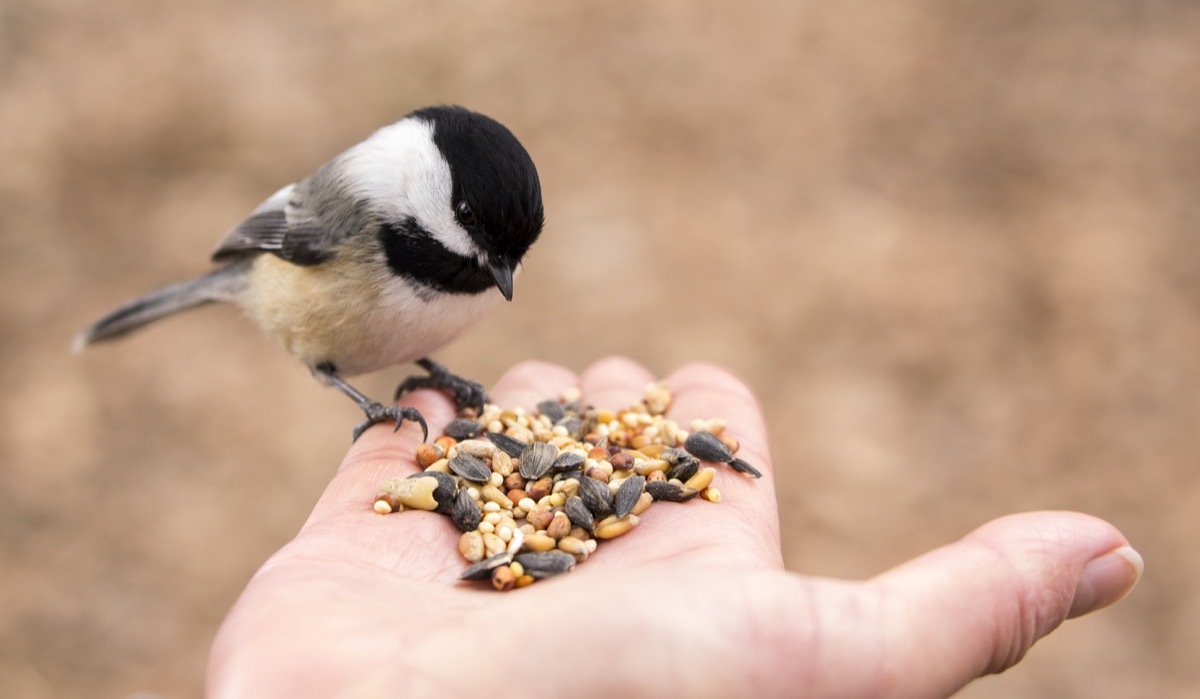Ang nakakatakot na dahilan na hindi mo dapat pakainin ang mga ibon ngayon, nagbabala ang mga opisyal
Ang isang simpleng alay ay mayroon na ngayong malubhang kahihinatnan.

From setting up backyard bird feeders to tossing crumbs on the ground in the park, the easiest way to interact with birds is usually offering food. And while experts often warn against trying to feed birds certain types of food—like bread—the practice is generally smiled upon. According to the U.S. Fish & Wildlife Service, some studies have found that feeders can help birds survive migration and harsh winters. Bird lovers who take this as reason enough to keep sharing meals should heed a new alert, however. Read on to find out why health officials are warning you not to feed birds right now.
RELATED: If You Have This Tree in Your Yard, Cut It Down Now, Officials Warn.
Bird flu is rapidly spreading across the U.S. right now.

The Centers for Disease Control and Prevention (CDC) recently warned that it is currently monitoring the worst outbreak of avian influenza, otherwise known as bird flu, that the U.S. has seen in more than five years, NBC News reported. As of right now, more than 24 million domestic chickens, turkeys, and other domestic birds have been killed in the U.S. since Feb. 2022 because of the outbreak, according to USA Today.
In 2015, nearly 50 million birds were euthanized or died as a result of bird flu. But the virus could continue to spread to an even greater degree in 2022. "This outbreak I think is likely going to be bigger than 2015," Henry Niman, PhD, a virologist and biochemist in Pittsburgh who has been tracking the bird flu's spread, told NBC News, adding the he is expecting an "explosion" of bird flu cases in the coming weeks.
And according to data from the U.S. Department of Agriculture (USDA), birds or poultry infected with the highly pathogenic avian influenza (HPAI) have been found in more than 30 states so far this year, as of April 14. And experts say the far reach of this current outbreak might also be cause for concern. "I think we're certainly seeing more geographic spread than what we saw with 2014-2015," Andrew Bowman, PhD, an associate professor at Ohio State University's College of Veterinary Medicine, told The New York Times.
Officials are warning against feeding wild birds right now.

As bird flu cases continue to rise, officials are sending new warnings to people in the U.S. to try to mitigate the spread. "Do not feed wild waterfowl and shorebird species. This not only causes the birds to congregate, increasing the chance of disease spread between individuals, it also increases their contact with humans," officials from the Forest Preserve District of DuPage Count in Illinois said in a statement.ae0fcc31ae342fd3a1346ebb1f342fcb
The CDC said that infected birds shed bird flu viruses in their saliva, mucus, and feces. And if enough virus is inhaled or makes its way into a person's eyes, nose, or mouth, human bird flu infections can occur as well. "As a general precaution, people should avoid direct contact with wild birds and observe them only from a distance, if possible. Wild birds can be infected with bird flu viruses without appearing sick," the agency warned.
Victoria Hall, DVM, the executive director of The Raptor Center at the University of Minnesota, even advised people to pause the use of bird feeders and bird baths right now. In an April 13 Facebook post, Hall wrote that these "encourage birds to gather together" as well, which is dangerous given the current rate of virus transmission. "These are places where things like viruses could easily be exchanged between individuals," she wrote.
RELATED: For more up-to-date information, sign up for our daily newsletter.
There have been no bird flu infections reported among humans in the U.S.

According to the CDC, the current bird flu viruses have only resulted in one reported human infection globally. In Jan. 2022, a person from the U.K. was infected after raising birds that had come down with bird flu viruses, but the individual exhibited no symptoms. There have been no bird flu infections reported in the U.S. so far. "Right now, the H5N1 bird flu situation is primarily an animal health issue," the CDC said in a March 7 statement.
"Based on past experience with earlier H5N1 bird flu viruses—and what is known about this group of viruses from existing epidemiologic and genetic sequence data—CDC believes the health risk to the general public is low," Kate Grusich, a spokesperson for the CDC, added in a statement to NBC News.
But experts warn that this could always change.

Habang ang panganib sa pangkalahatang publiko ay naisip na mababa, ang CDC ay nagbabala na kung mas malamang na malantad ka sa mga ibon-maging mula sa iyong trabaho o libangan na pursuits-maaari kang maging mas mataas na panganib ng impeksiyon. Ayon sa ahensiya, mayroong higit sa 140 katao sa U.S. Sa panahong ito na nagkaroon ng pagkakalantad ng bird flu mula sa mga nahawaang ibon o manok, at kasalukuyang sinusubaybayan upang makita kung kontrata nila ang virus.
Dahil dito at ang potensyal para sa sitwasyon ay magbago, sinabi ng CDC na ito ay "pagkuha ng regular na paghahanda at pag-iwas sa mga hakbang kung sakaling ang virus na ito ay nagbabago upang magkaroon ng mas malaking panganib sa kalusugan ng tao." Pagkatapos ng lahat, ang patuloy na pagkalat ng virus sa mga ibon ay maaaring magbigay ng higit pa sa isang pagkakataon upang mutate at maging higit pa sa isang isyu sa mga tao-tulad ng covid.
"Mga bagong strains ng influenza na ipinakilala sa populasyon ng tao at maaaring maging sanhi ng mga pandaigdigang pandemya na kadalasang nagmula sa mga pinagmumulan ng hayop na ito, sa partikular na mga ibon,"William Schaffner., MD, isang nakakahawang sakit na eksperto sa Vanderbilt University Medical Center, sinabi sa NBC News. "May panganib na ang ilan sa mga bird flu strains ay maaaring kunin ang genetic na kakayahan upang makahawa sa mga tao."

Ako ay isang nakakahawang sakit na doktor. Narito kung paano ako magpasya kung ano ang ligtas na gawin at kung ano ang hindi.

Nagbabanta ang Marshalls Shoppers Boycott Over Checkout: "Kunin ang Kontrol ng Iyong Mga Linya"
